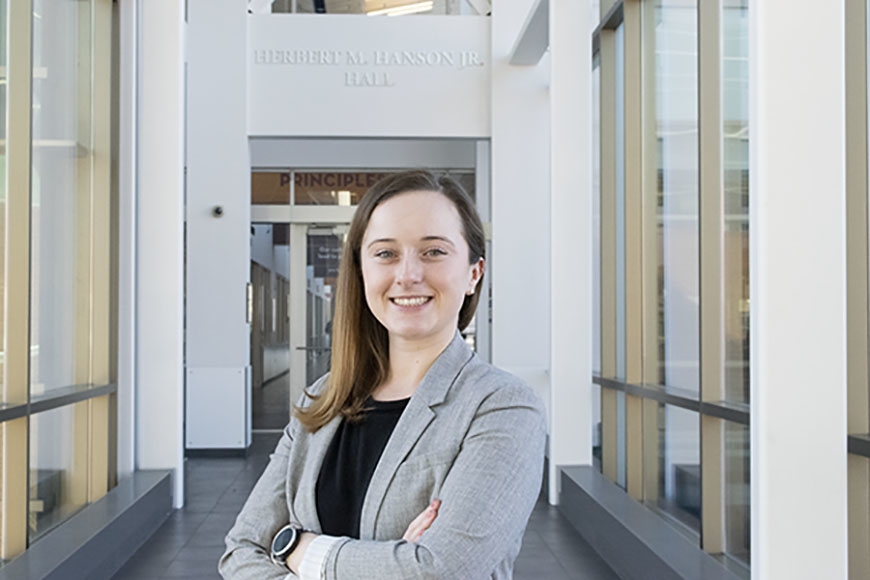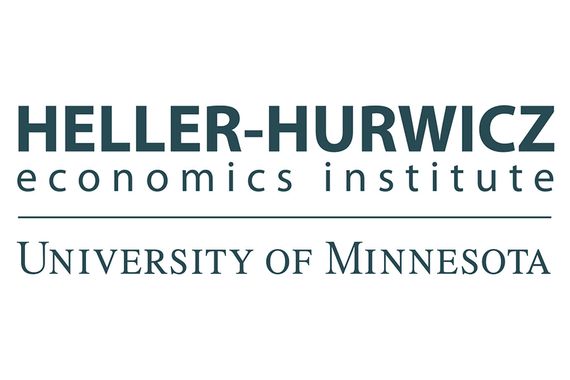A Good Handle on a Messy Process
Do policy announcements by the Federal Reserve Bank (the Fed) affect people’s expectations for future monetary policies? Graduate student Amy Handlan is conducting research to find the answer. However, this question wasn’t the one Handlan initially set out to answer.
Back to the Beginning
Now a fifth-year PhD student, Handlan first came to Minnesota to learn from the influential set of UMN economists who work on financial crises and default. “My undergraduate research was really focused on how governments and economies interact. I was particularly interested in understanding financial crises and how government transition relates to financial crises.”
However, that’s not exactly what she ended up studying. ”Research is a messy process,” laughs Handlan. “A lot of times you have a vague intuition of the broader topic you want to explore, but it takes a lot of time to narrow it down to a precise question.” After briefly considering different topics related to how people form expectations about the future, Handlan decided to go back to analyzing how policy announcements by the Federal Reserve Bank affect expectations about future monetary policy.
Handlan has now started putting her theory to test, “I want to see if what the Federal Reserve Bank says matters, and if so which words have the most impact!” To do this, she employs machine learning algorithms to draw up a representation of how statements relate to expectations.
Handlan also currently assists her advisor, Christopher Phelan, with his research at the Federal Reserve Bank of Minneapolis. She believes that this opportunity to interact with economists and talk candidly about research is one of the defining features of Minnesota’s graduate program.
“I feel lucky that, here at UMN, we as graduate students get the opportunity to be on a first-name basis and talk frequently with renowned economists,” she says. “The best part about being here is that you get to work with some of the greatest economists in the field.” Handlan credits the long-standing relationship between the economics department and the Federal Reserve Bank of Minneapolis for this unique opportunity.
Merging Two Roads
Handlan’s research interests weren’t the only reason she chose to come to the University of Minnesota. “Another big reason was that they are very upfront about how graduate students are able to teach. For me, being able to get that teaching experience was a very big plus.” Handlan elaborates, “I look at teaching undergraduates as a way to verify that I understand the fundamentals of economics.”
In the fall of 2018 the director for undergraduate studies, Dr. Simran Sahi, nominated Handlan for the Career Readiness Graduate Teaching Fellowship program, which enabled her to explore different teaching methods. She adds, “This fellowship has shaped my teaching philosophy; it is all about trying to make my class accessible for different kinds of learners, encouraging metacognition and reflection.”
More recently, in the fall of 2019, Handlan was awarded a Doctoral Dissertation Fellowship, which enabled her to focus more on her research. The Doctoral Dissertation Fellowship gives the University’s most exceptional PhD students the opportunity to focus solely on their research by waiving their teaching responsibilities during their fellowship year, thus giving them time to write and finalize their dissertation. “I never realized how much time I was spending teaching because I enjoyed it,” admits Handlan.
Although she misses some aspects of teaching, she is grateful for what the fellowship allows her to do. “If you work on one thing for multiple days over time you can get momentum that allows you to become more productive.”
Terms and Conditions Apply
Being an economist is no easy feat, and when asked what the most important aspects of being an economist are, Handlan laughs: “That’s a tough question.”
She believes that an essential but often overlooked part of being an economist is ensuring that your research is understood by not only finance market experts and other economists, but also by people looking to invest in the market who have little to no exposure to economic terms. Handlan understands this, and knows that while it is important for what an economist says to be understood by a larger audience, there is a trade-off when some nuances can get lost in an effort to simplify complex theories.
“I think there is a balance,“ says Handlan, “a sort of threshold. It is important to be able to communicate with people about what’s happening, but at the same time we cannot do away with a lot of detail.”
Handlan hopes to continue exploring how to quantify human behavior and the influence change has on expectations. “I think as economists, one of the most important things we do is use quantitative methods to study how humans behave and model expectations that stem from this behavior."
This story was written by an undergraduate student in Backpack. Meet the team.



